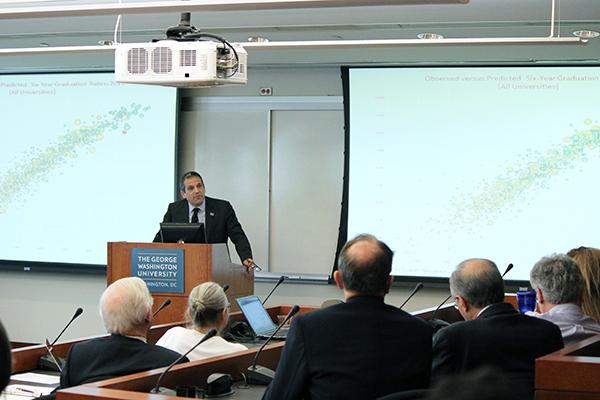Faculty leaders still say they don’t understand how GW is managed.
After the Board of Trustees made a change to the faculty code last year without final input from faculty, members of the Faculty Senate are ensuring that they will be consulted on the exact wording of any future changes. After a years-long process of clarifying how GW is managed, faculty say the code changes have made the decision-making process more unclear.
The Faculty Senate hopes to pass a resolution on the topic at their April meeting. The faculty code is the backbone of GW’s governance structure and dictates how faculty, administrators and the Board of Trustees reach decisions.
The Board of Trustees changed the code to allow non-tenured faculty to join the Faculty Senate, which the Faculty Assembly – which is made up of all faculty – overturned in the fall. The changes also allow faculty to participate in dean searches and gave written criteria for awarding promotions and tenure.
Faculty complained that they were not involved enough in code changes before the trustees passed the new regulations.
After the overhauls to the code last year, Charles Garris, the chair of the Faculty Senate’s executive committee, said it is not surprising there are some misunderstandings among faculty and administrators. He said he hopes the April resolution will incentivize the Board of Trustees to bring up the code at their June meeting.
“I think we all understand that there were major changes in the faculty code, there’s bound to be some glitches,” Garris said.
Garris said the new faculty code added the word “full-time” in reference to certain faculty positions, when they had formerly been divided by regular and specialized faculty.
Garris said the executive committee has worked with interim Provost Forrest Maltzman and University President Steven Knapp to find ways to change the code’s language and better explain which faculty have certain participation rights.
“If you plow through the new faculty code, you’ll see some places where they talk about faculty and some places they talk about regular faculty. Some people have raised questions that it’s not exactly correct in every situation,” he said.
Garris added that tenured faculty may not work full-time or could be partially retired, which muddles their participation rights in the new system.
“Those faculty very often want to be involved in governance, but this language might shut them out from participating in governance,” Garris said.
The executive committee of the Faculty Senate has also been working on how to make the faculty code clearer for faculty members and how to lay out a clear process for amending the rules.
Currently, the Board of Trustees has the final say on any changes to the faculty code. Garris said only the executive committee was allowed to provide input before the board made changes, and other members of the senate hope to be more involved in the final stages of decision-making.
“One of the things we’re working on now is to put a new section into the faculty code that requires the senate be consulted and given an opportunity to voice its opinion on any changes to the faculty code,” Garris said.







